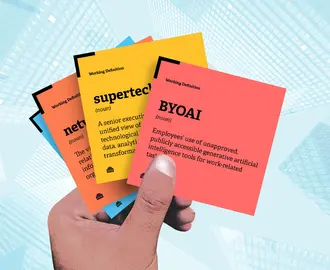Change Management
Don’t get caught in a cycle of correcting employee weakness
Focusing only on your employees’ weaknesses can drag your organization down, but identifying and nurturing their strengths can lift it higher than ever.
When Jan Mühlfeit became the director of Microsoft’s Central and Eastern Europe region in 2000, he noticed a disturbing trend: Management was attempting to improve performance by focusing heavily on correcting employees’ weaknesses, and no one seemed all that happy about it.
“We would say, here are four weaknesses. Come back in a year and we will give you another four weaknesses to work on,” said Mühlfeit, speaking May 8 at an MIT Sloan Technology Club and European Business Club event. “No wonder that the team was not getting better.”
He decided to take a new approach and began focusing on and encouraging the team’s strengths instead. The difference was stark and immediate: His region reached the top of Microsoft’s worldwide rankings, and it stayed there for the next four years.
Mühlfeit, who went on to become the chairman of Microsoft Europe and now coaches athletes, executives, children, and others around the world, said that outcome was a direct result of applying a philosophy he termed “positive leadership.” He details the approach in his new book, “The Positive Leader: How Energy and Happiness Fuel Top-Performing Teams.”
To be a positive leader, Mühlfeit said, a manager first must understand themselves and their own strengths, then harness that insight to be able to identify and cultivate other people’s talents. Doing so can allow synergies to form more easily between colleagues, drawing on each other’s strengths while supporting their weaknesses.
Mühlfeit said most people make four big mistakes, instilled at a young age, that erect barriers to realizing their potential:
- Focusing on their weaknesses instead of their strengths
- Planning for the “what” and “how” of their goals instead of the “why”
- Trying to manage their time instead of their energy
- Putting too much emphasis on being successful rather than being happy on the way there
Rather than the criticism-first approach seen in most of the world’s education systems, which focus heavily on a pupil’s weaknesses in an attempt to eradicate them, he recommends a system of positive reinforcement followed by constructive criticism. That, he said, helps temper the influence of two factors, time and fear, that limit peak performance and allows the person to operate in just the moment at hand.
That’s how managers can help people enter what Mühlfeit called “the flow” — the state where their innate talents coalesce with the challenges facing them to reach their full potential.
“If you are able to unlock your talents, you will be in the flow and you will learn faster, and the same is true for the organization,” he said.




